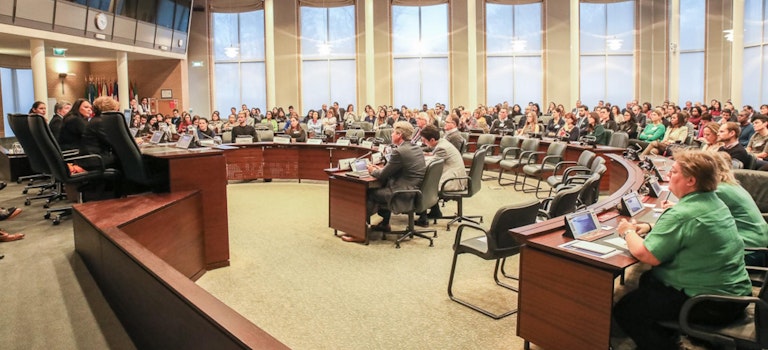The Organisation for the Prohibition of Chemical Weapons (OPCW) hosted its second event on the importance of diversity and inclusion in the workplace on 11 January. The Diversity and Inclusion in the Workplace Event provides a forum for staff from international organisations to share their stories and ideas for progress. The event was organised by The Hague Inter-Agency Diversity and Inclusion Network, which is a group of volunteer staff from the OPCW, the International Criminal Court (ICC), the UN International Residual Mechanism for Criminal Tribunals (IRMCT), and the Special Tribunal for Lebanon (STL), and was attended by more than 100 diplomats, senior officials, and staff from international organisations.
During their keynote addresses, H.E. Ms María Teresa Infante, Ambassador of Chile to the Kingdom of the Netherlands and Permanent Representative to the OPCW, and H.E. Ms Sabine Nölke, Ambassador of Canada to the Kingdom of the Netherlands and Permanent Representative to the OPCW, emphasised the importance of an inclusive work environment for all staff.
Ambassador Infante underlined that: “In a society that values human rights and acknowledges the unique moral character of each human being, issues such as diversity, gender and disabilities are an integral part of the political and legal analysis at various levels, including planning and government.”
Ambassador Nölke stated: “Diversity is a fact. Inclusion is a choice. International organisations should reflect the people they represent, not just the countries…the whole rainbow of humanity.”
Four presentations explored the topics of gender, LGBTIQ, disability, and mental health at work through personal experiences and lessons learned.
Gender Focal Points and Human Resources representatives shared challenges, successes, and hopes related to recent gender parity initiatives and the commitments of the International Gender Champions, which is a leadership network that brings together female and male decision-makers determined to break down gender barriers and make gender equality a reality.
Personal stories from speakers illustrated the challenges still facing women, people with disabilities or mental health issues, and the LGBTIQ community within the workplace today while also providing attendees with insights on inclusive language and behaviour. A UN counsellor spoke about the effects of mental health stigmas and how managers can minimise their impact.
The event was followed by time to network, which included a silent disco providing attendees with the opportunity to dance, while being mindful of people with noise sensitivities. Catering was provided by the Upside Café, which employs individuals with Down syndrome and other disabilities.
Considering the positive feedback from the participants, the Hague Inter-Agency Diversity and Inclusion Network anticipates organising future forums to further advance the goals of diversity and inclusion.
Background
The Hague Inter-Agency Diversity and Inclusion Network was created in September 2017 when 18 volunteer staff members from the OPCW, ICC, IRMCT and STL came together for The Hague’s first Training-of-Trainers programme presented by the United Nations for All office in New York, USA.
Since then, the Network has been delivering diversity and inclusion trainings and it has been working within their respective organisations to enhance pertinent policies. The Network volunteers are not subject matter experts and the training courses that they facilitate are based on the “UN for All” curricula.
As the implementing body for the Chemical Weapons Convention, the OPCW, with its 193 Member States, oversees the global endeavour to permanently eliminate chemical weapons. Since the Convention’s entry into force in 1997, it is the most successful disarmament treaty eliminating an entire class of weapons of mass destruction.
Over 96% of all chemical weapon stockpiles declared by possessor States have been destroyed under OPCW verification. For its extensive efforts in eliminating chemical weapons, the OPCW received the 2013 Nobel Peace Prize.
OPCW Press release — THE HAGUE, Netherlands, 15 January 2019
